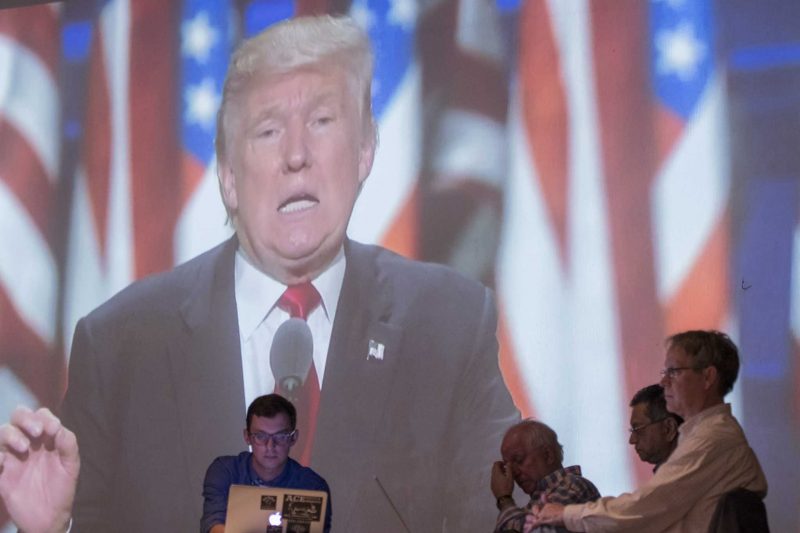Professors and students came into the Political Science Department’s watch party in Mckenna Theatre confident that the 45th president would be democratic candidate, Hillary Clinton. But as the night continued, the room filled with anger and frustration as Trump gained momentum, eventually winning the 2016 presidential election.
The American politics professors hosting the event, Marcela Garcia-Castanon, Justin Peck, Joel Kassiola and Francis Neely, began with commentary on the three state decisions already in. Indiana and Kentucky, which are historically known to be Republican states, did not veer from the usual. Vermont gave its three electoral votes to Democratic candidate Hillary Clinton.
“I’m super excited. This is like political Christmas for me.” Garcia-Castanon gushed.
Kassiola and Garcia-Castanon engaged the crowd by asking the audience political questions and as more students trickled in they began streaming the election coverage on stage, going back and forth between a map of state results and PBS Newshour.
“I expect that Hillary Clinton will win 340 electoral votes and become the next president,” Peck said, hours before the results were revealed. “Popular vote wise, I would guess that she does something between 4 percent and 6 percent, which is a lot. She’s going to win big.”
The watch party was initially part of a class but eventually expanded, inviting everyone in the school. The class, The 2016 Presidential Election: Issues and Analysis, was created by Kassiola in 2004 and is a series of online and in-person classes that discuss the important topics of the election.
“We’ve invited people from history, environmental studies, the health equity program; from departments all across campus.” Garcia-Castanon said. “We invite people who are directly tied to the school because we don’t encounter them otherwise; it’s a really nice way of engaging cross-departments.”
She agreed with Peck that Clinton would take the victory as the 45th president, but joked that she’s exhausted by this election.
“I would like this election to be over,” Garcia-Castanon laughed. “But I try to stay as objective as possible. It’s really interesting that we have the first women who’s a candidate of a major party. It’s historic that it’s within 100 years of women being given the right to vote. I feel like we forget that.”
Around 6 p.m., as more state decisions slowly came in, results showed that Clinton did well in the east coast, while Trump was sweeping the south and midwest. With a wall of red on the map, worry emerged in the crowd.
“We didn’t bring any EMTs so don’t go passing out,” Kassiola joked. “Don’t go buy this duration of time on the map. We still have plenty of time.”
When an audience member asked about possible GOP results, it brought professor Neely to his views on a Trump presidency.
“He doesn’t want to be the president, he wants to be the winner,” Neely said.
Psychology major Isabella Guevara agreed, and her dismay about the republican candidate was clear when asked about her reaction to his possible win.
“I think he’ll get impeached,” Guevara said. “He won’t have as much power as he think he will.”
After the professors asked the audience and vice versa, the entire room came to the same agreement as Peck and Garcia-Castanon, but by 10 p.m. the room had given up hope. With only three states left, Trump was unofficially announced the winner of the popular vote, with 244 electoral votes compared to Clinton’s 215.
After hours of trying to remain optimistic, watch party attendee Megan Hickman joined those who had given up hope.
“As a queer woman and a chickasaw, I’m afraid,” Hickman said. “He’s a businessman, he’s not going to care about sustainability. He’s going to keep making money not caring about the impact.”
Computer science major Jonathan Kldani’s main concern was his family’s well being in a Trump presidency.
“I’m worried about my family and if we’ll still have health care,” Kldani said.
Although student and professor projections about this year’s presidential election were wrong, students began trying to adjust to the reality of a Trump presidency.
“I think it hasn’t kicked in,” Business management major Marcela Cristina Alvarez said. “I feel that it’s a joke and I’m waiting for someone to be like ‘this isn’t real,’ but it is real.”






Adria • Nov 9, 2016 at 1:06 pm
You captured sentiments felt around the world. Unfortunately, if voting yesterday was the only encounter they’ve had with the political process this year, they are part of the problem. Civic engagement is a continual process. When you are engaged locally you can choose to diminish or enhance the effect a president has on your life.